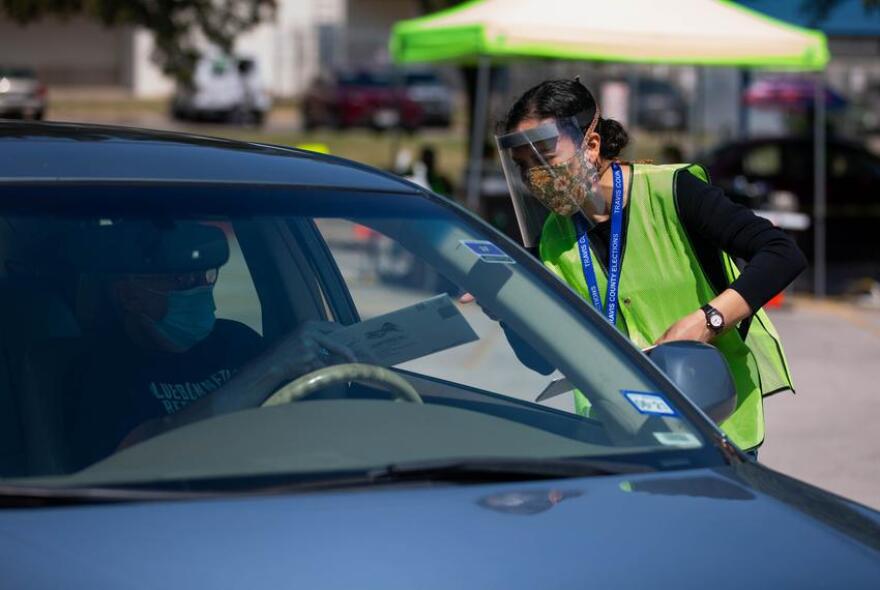A Travis County judge on Thursday ruled that Texas counties can have multiple drop-off locations for hand delivery of absentee ballots, overriding Gov. Greg Abbott's recent directive limiting counties to one drop-off location. But it remains unclear if state District Judge Tim Sulak's decision will lead to the reopening of ballot drop-off locations that were shut down in Harris and Travis counties after Abbott's order.
Texas Attorney General Ken Paxton, on behalf of Abbott and Texas Secretary of State Ruth Hughs, immediately filed an appeal that paused Sulak's decision until the state's 3rd Court of Appeals in Austin reviews it.
Sulak's ruling is the latest turn in a handful of lawsuits in state and federal courts challenging Abbott’s Oct. 1 order, which shut down multiple ballot drop-off locations in Harris and Travis counties.
The Travis County lawsuit, filed by a Texas-based Anti-Defamation League, voting rights advocacy group and a voter, is similar to several federal lawsuits. On Monday, a federal appeals court upheld the Republican governor’s order under federal law, overturning a lower court’s ruling. The Travis County decision, however, applies to potential violations of state law.
The state court challenge argues that the governor doesn’t have authority under state law to limit absentee ballot hand delivery locations and that his order violates voters’ equal protection rights under the state constitution.
“The limitation to a single drop-off location for mail ballots would likely needlessly and unreasonably increase risks of exposure to COVID-19 infections, and needlessly and unreasonably substantially burden potential voters’ constitutionally protected rights to vote, as a consequence of increased travel and delays, among other things,” Sulak wrote.
Acting on concerns of voter safety during a pandemic, Abbott in July lengthened the early voting period and extended the time voters have to deliver completed absentee ballots in person to county clerk offices. But after large Democratic counties, including Harris and Travis, established several sites where voters could deliver their ballots, Abbott issued an order that limited such drop-off locations to one per county.
Before the governor's Oct. 1 order, Travis County had four drop-off locations for hand delivery of mail-in ballots and Harris County had a dozen in place. To drop off a mail-in ballot in person at any location, voters must present an approved form of identification to the poll worker, and voters may not turn in any one else’s ballot.
While a spokesperson for the governor did not answer questions on how allowing multiple locations for ballot delivery might lead to fraud, according to a filing by Texas Attorney General Ken Paxton, it had become clear that counties including Harris, Travis and Fort Bend, which had recently announced plans to open multiple mail-in-ballot delivery locations, wouldn’t provide “adequate election security, including poll watchers.” These “inconsistencies,” he said, “introduced a risk to ballot integrity, such as by increasing the possibility of ballot harvesting.”
The governor's limiting order was quickly challenged by multiple voting right groups in federal court and in Travis County. And three Democratic chairs of high-profile congressional committees called the move an apparent "last-ditch effort to suppress Texans’ ability to vote."
Abbott's order, however, has been upheld in federal appellate court. Max Feldman, council at the Brennan Center for Justice, which is representing the ADL and other plaintiffs in the lawsuit, said Thursday that though some of their arguments are the same as those that lost in federal court, state courts can uphold different rulings based on state law.
"While there are similarities in terms of the scope of the rights, the federal courts' view of the federal constitution does not control the state courts' resolution of these issues under the state constitution," he said.
________________________________________________
Disclosure: The Texas secretary of state has been a financial supporter of The Texas Tribune, a nonprofit, nonpartisan news organization that is funded in part by donations from members, foundations and corporate sponsors. Financial supporters play no role in the Tribune's journalism. Find a complete list of them here.




